- Home
- Michael Grant
Hunger_A Gone Novel Page 3
Hunger_A Gone Novel Read online
Page 3
her little brother. Pete was five years old, just barely, and
severely autistic. He could talk, but mostly he didn’t. He had
become, if anything, even more withdrawn since the coming
of the FAYZ. Maybe it was her fault: she wasn’t keeping up
with the therapy, wasn’t keeping up with all the futile, pointless exercises that were supposed to help autistics deal with reality.
Of course Little Pete made his own reality. In some very
important ways he had made everyone’s reality.
The yard was not Astrid’s yard, the house not her house.
Drake Merwin had burned her house down. But one thing
there was no shortage of in Perdido Beach was housing.
Most homes were empty. And although many kids stayed in
their own homes, some found their old bedrooms, their old
20 M I C H A E L
G R A N T
family rooms, too full of memories. Astrid had lost track of
how many times she’d seen kids break down sobbing, talking
about their mom in the kitchen, their dad mowing the lawn,
their older brother or sister hogging the remote.
Kids got lonely a lot. Loneliness, fear, and sadness haunted
the FAYZ. So, often kids moved in together, into what
amounted almost to frat or sorority houses.
This house was shared by Astrid; Mary Terrafino; Mary’s
little brother, John; and more and more often, Sam. Officially
Sam lived in an unused office at town hall, where he slept on
a couch, cooked with a microwave, and used what had been
a public restroom. But it was a gloomy place, and Astrid had
asked him more than once to consider this his home. They
were, after all, a family of sorts. And, symbolically at least,
they were the first family of the FAYZ, substitute mother and
father to the motherless, fatherless kids.
Astrid heard Sam before she saw him. Perdido Beach had
always been a sleepy little town, and now it was as quiet as
church most of the time. Sam came through the house, letting himself in, calling her name as he went from room to room.
“Sam,” she yelled. But he didn’t hear her until he opened
the back door and stepped out onto the deck.
One glance was all it took to know something terrible had
happened. Sam wasn’t good at concealing his feelings, at least
not from her.
“What is it?” she asked.
He didn’t answer, just strode across the weedy, patchy grass
H U N G E R
21
and put his arms around her. She hugged him back, patient,
knowing he’d tell her when he could.
He buried his face in her hair. She could feel his breath
on her neck, tickling her ear. She enjoyed the feel of his body
against hers. Enjoyed the fact that he needed to hold her. But
there was nothing romantic about this embrace.
At last he let her go. He moved to take over pushing Little
Pete, seeming to need something physical to do.
“E.Z.’s dead,” he said without preamble. “I was touring the
fields with Edilio. Me, Edilio, and Albert, and E.Z. along for
entertainment. You know. No good reason for E.Z. to even be
there, he just wanted to ride along and I said okay because I
feel like all I ever do is say no, no, no to people, and now he’s
dead.”
He pushed the swing harder than she’d been doing. Little
Pete almost fell backward.
“Oh, God. How did it happen?”
“Worms,” Sam said dully. “Some kind of worm. Or snake.
I don’t know. I have a dead one in there on the kitchen counter. I was hoping you’d . . . I don’t know what I was hoping. I figure you’re our expert on mutations. Right?”
He said the expert part with a wry smile. Astrid wasn’t an
expert on anything. She was just the only person who cared
enough to try and make sense in a systematic, scientific way
of what was happening in the FAYZ.
“If you keep pushing him, he’ll be fine,” Astrid said of her
brother.
She found the creature in a Baggie on the kitchen counter.
22 M I C H A E L
G R A N T
It looked more like a snake than a worm, but not like any
normal snake, either.
She pressed gingerly on the bag, hoping it really was dead.
She spread waxed paper on the granite counter and dumped
the worm out. She rummaged in the junk drawer for a tape
measure and did her best to follow the contours of the creature.
“Eleven inches,” she noted.
Then she found her camera and took a dozen photos from
every angle before using a fork to lift the monstrous thing
back into the Baggie.
Astrid loaded the pictures onto her laptop. She dragged
them into a folder labeled “Mutations—Photos.” There were
dozens of pictures. Birds with strange talons or beaks. Snakes
with short wings. Subsequent pictures showed larger snakes
with larger wings. One, taken at a distance, seemed to show a
rattlesnake the size of a small python with leathery wings as
wide as a bald eagle’s.
She had a blurry photo of a coyote twice the size of any
normal coyote. And a close-up of a dead coyote’s mouth
showing a strangely shortened tongue that looked creepily
human. There was a series of grotesque JPEGs of a cat that
had fused with a book.
Other photos were of kids, most just looking normal,
although the boy called Orc looked like a monster. She had a
picture of Sam with green light blazing from his palms. She
hated the picture because the expression on his face as he
demonstrated his power for her camera was so sad.
H U N G E R
23
Astrid clicked opened the worm pictures and used the
zoom function to take a closer look.
Little Pete came in, followed by Sam.
“Look at that mouth,” Astrid said, awestruck. The worm
had a mouth like a shark. It was impossible to count the hundreds of tiny teeth. The worm seemed to be grinning, even dead, grinning.
“Worms don’t have teeth,” Astrid said.
“They didn’t have teeth. Now they do,” Sam said.
“See the things sticking out all around its body?” She
squinted and zoomed in closer still. “They’re like, I don’t
know, like minuscule paddles. Like legs, only tiny and thousands of them.”
“They got into E.Z. I think they went right through his
hands. Right through his shoes. Right through his body.”
Astrid shuddered. “Those teeth would bore through anything. The legs push it forward once it’s inside its victim.”
“Thousands of them in that field,” Sam said. “E.Z. goes in,
they attack him. But me and Albert and Edilio are outside, we
haven’t stepped into the field, and they don’t come after us.”
“Territoriality?” Astrid frowned. “Very unusual in a primitive animal. Territoriality is usually associated with higher life-forms. Dogs or cats are territorial. Not worms.”
“You’re being very calm about all this,” Sam said, almost
but not quite accusingly.
Astrid looked at him, reached with her hand to gently turn
him away from the horrible image, forcing him to look at her
instead. “You didn’t com
e to me so I could scream and run
24 M I C H A E L
G R A N T
away and you could be brave and comforting.”
“No,” he admitted. “Sorry. You’re right: I didn’t come to
see Astrid my girlfriend. I came to see Astrid the Genius.”
Astrid had never liked that nickname much, but she’d
accepted it. It gave her a place in the dazed and frightened
community of the FAYZ. She wasn’t a Brianna or a Dekka,
or a Sam, with great powers. What she had was her brain and
her ability to think in a disciplined way when required.
“I’ll dissect it, see what I can learn. Are you okay?”
“Sure. Why not? This morning I was responsible for 332
people. Now I’m only responsible for 331. And part of me is
almost thinking, okay, one less mouth to feed.”
Astrid leaned close and kissed him lightly on the mouth.
“Yeah, it sucks to be you,” Astrid said. “But you’re the only
you we have.”
That earned her a bleak smile. “So, shut up and deal with
it?” he said.
“No, don’t ever shut up. Tell me everything. Tell me anything.”
Sam looked down, unwilling to make eye contact. “Everything? Okay, how about this: I burned the body. E.Z. I burned the mess they left behind.”
“He was dead, Sam. What were you supposed to do? Leave
him for the birds and the coyotes?”
He nodded. “Yeah. I know. But that’s not the problem. The
problem is, when he burned? He smelled like meat cooking,
and I . . .” He stopped talking, unable to go on. She waited
while he mastered his emotions. “A dead sixth grader was
H U N G E R
25
burning, and my mouth started watering.”
Astrid could too easily imagine it. Even the thought of
burning meat made her mouth water. “It’s a normal, physiological reaction, Sam. It’s a part of your brain that’s on automatic.”
“Yeah,” he said, unconvinced.
“Look, you can’t go around moping because something
bad happened. If you start acting hopeless, it will spread to
everyone else.”
“Kids don’t need my help to feel hopeless,” he said.
“And you’re going to let me cut your hair,” Astrid said,
pulling him close and ruffling his hair with one hand. She
wanted to get his mind off the morning’s disaster.
“What?” He looked confused by the sudden change of
topic.
“You look like a fugitive from some old 1970s hair band.
Besides,” she argued, “Edilio let me cut his hair.”
Sam allowed himself a smile. “Yeah. I saw. Maybe that’s
why I keep accidentally calling him Bart Simpson.”
When she glared at him, he added, “You know, the spiky
look?” He tried to kiss her, but she drew back.
“Oh, you’re just so clever, aren’t you?” she said. “How about
I just shave your head? Or hot-wax it? Keep insulting me,
people will be calling you Homer Simpson, not Bart. Then
see how much Taylor makes goo-goo eyes at you.”
“She does not make goo-goo eyes at me.”
“Yeah. Right.” She pushed him away playfully.
“Anyway, I might look good with just two hairs,” Sam said.
26 M I C H A E L
G R A N T
He looked at his reflection in the glass front of the microwave.
“Does the word ‘narcissist’ mean anything to you?” Astrid
asked.
Sam laughed. He made a grab for her but then noticed Little Pete eyeing him. “So. Anyway. How’s LP doing?”
Astrid looked at her brother, who was perched on a kitchen
counter stool and gazing mutely at Sam. Or, anyway, in Sam’s
direction—she could never be sure what he was really looking at.
She wanted to tell Sam what had been happening with Little Pete, what he had started doing. But Sam had enough to worry about. And for a moment—a rare moment—he wasn’t
worrying.
There would be time later to tell him that the most powerful person in the FAYZ seemed to be . . . what would the right term be for what Little Pete was doing?
Losing his mind? No, that wasn’t quite it.
There was no right term for what was happening to Little
Pete. But, anyway, this wasn’t the time.
“He’s fine,” Astrid lied. “You know Petey.”
THREE
106 HOURS, 11 MINUTES
L A N A A R W E N L A Z A R was on her fourth home since
coming to Perdido Beach. She’d first stayed in a house she’d
liked well enough. But that house was where Drake Merwin
had captured her. It felt like a bad place after that.
Then she’d moved in with Astrid for a while. But she
quickly discovered that she preferred being alone with just
her Labrador retriever, Patrick, for company. So she’d taken a
house near the plaza. But that had made her too accessible.
Lana didn’t like being accessible. When she was accessible,
she had no privacy.
Lana had the power to heal. She’d first discovered this
ability the day of the FAYZ, when her grandfather had disappeared. They’d been driving in his pickup truck at the time, and the sudden disappearance of the driver had sent the truck
rolling down a very long embankment.
Lana’s injuries should have killed her. Almost did kill her.
Then she discovered a power that might have lain hidden
within her forever, but for her terrible need.
28 M I C H A E L
G R A N T
She had healed herself. She’d healed Sam when he was shot;
and Cookie, whose shoulder had been split open; and many
wounded children after the terrible Thanksgiving Battle.
The kids called her the Healer. She was second only to Sam
Temple as a hero in the FAYZ. Everyone looked up to her.
Everyone respected her. Some of them, especially the ones
whose lives she’d saved, treated her with something like awe.
Lana had no doubt that Cookie, for one, would give his life
for her. He had been in a living hell until she’d saved him.
But hero worship didn’t stop kids from pestering her at all
hours, day and night, over every little pain or problem: loose
teeth, sunburn, skinned knees, stubbed toes.
So she had moved away from town and now lived in a
room in the Clifftop Resort.
The hotel hugged the FAYZ wall, the blank, impenetrable
barrier that defined this new world.
“Calm down, Patrick,” she said as the dog head-butted
her in his eagerness for breakfast. Lana pried the lid off the
ALPO can and, blocking Patrick, spooned half of it into a
dish on the floor.
“There. Jeez, you’d swear I never feed you.”
As she said it she wondered how long she would be able to
go on feeding Patrick. There were kids eating dog food now.
And there were skin-and-bones dogs in the streets, picking
through trash next to kids who were picking through trash to
find scraps they’d thrown out weeks earlier.
Lana was alone at Clifftop. Hundreds of rooms, an algae-
choked pool, a tennis court truncated by the barrier. She had
a balcony that afforded a sweeping view of the beach below
H U N G E R
29
and the t
oo-placid ocean.
Sam, Edilio, Astrid, and Dahra Baidoo—who acted as
pharmacist and nurse—knew where she was and could find
her if they really needed her. But most kids didn’t, so she had
a degree of control over her life.
She looked longingly at the dog food. Wondering, not for
the first time, what it tasted like. Probably better than the
burned potato peels with barbecue sauce she’d eaten.
Once, the hotel had been full of food. But on Sam’s orders
Albert and his crew had collected it all, centralized it all at
Ralph’s. Where Drake had managed to steal a good portion
of the dwindling remainder.
Now there was no food in the hotel. Not even in any of the
mini-bars in the rooms, which once had been stocked with
delicious candy bars, and chips and nuts. Now all that was
left was alcohol. Albert’s people had left the booze, not knowing quite what to do with it.
Lana had stayed away from the little brown and white bottles. So far.
Alcohol was how she had managed to get herself exiled
from her home in Las Vegas. She’d snuck a bottle of vodka
from her parents’ house, supposedly for an older boy she
knew.
That was the cleaned-up story she’d managed to sell to her
parents, anyway. They had still packed her off for some time
to “think about what you’ve done” at her grandfather’s isolated ranch.
Now, in the world of the FAYZ, Lana was a sort of saint.
But she knew better.
30 M I C H A E L
G R A N T
Patrick had finished his food as coffee brewed in the room.
Lana poured herself a cup and dumped in a Nutrasweet and
some powdered cream, rare luxuries that she’d found by
searching the maids’ carts.
She stepped out onto the balcony and took a sip.
She had the stereo on, the CD player that had been in the
room. Someone, some previous inhabitant of the room, she
supposed, had left an ancient Paul Simon CD in there, and
she’d found herself playing it.
There was a song about darkness. A welcoming of darkness. Almost an invitation. She had played it over and over again.
Sometimes music helped her to forget. Not this song.
Out of the corner of her eye she spotted someone down on
the beach. She went back inside and retrieved a pair of binoculars she’d liberated from some long-gone tourist’s luggage.
Two little kids, they couldn’t be more than six years old,

 Fear
Fear Plague
Plague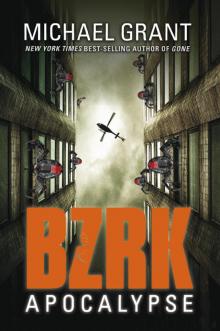 BZRK: Apocalypse
BZRK: Apocalypse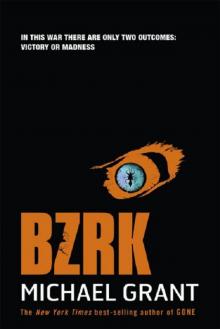 Bzrk
Bzrk Love Sucks and Then You Die
Love Sucks and Then You Die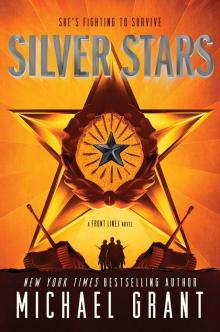 Silver Stars
Silver Stars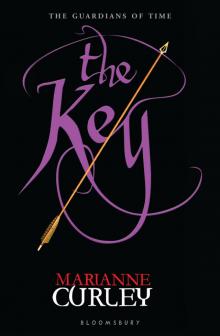 The Key
The Key Front Lines
Front Lines BZRK Origins
BZRK Origins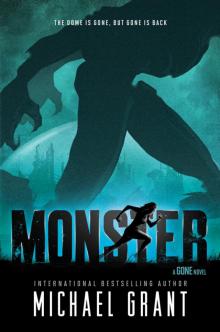 Monster
Monster Gone
Gone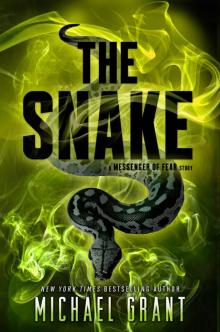 The Snake
The Snake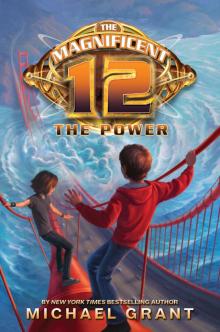 The Power
The Power Hunger
Hunger Lies
Lies A Sudden Death in Cyprus
A Sudden Death in Cyprus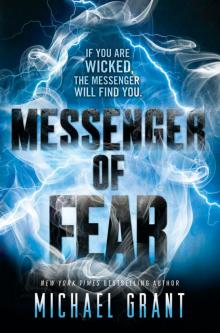 Messenger of Fear
Messenger of Fear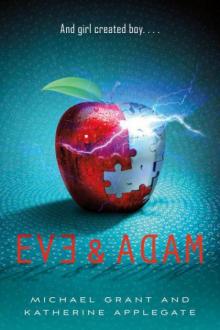 Eve & Adam
Eve & Adam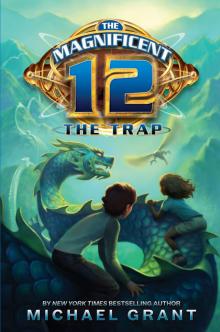 The Trap
The Trap Light
Light An Artful Assassin in Amsterdam
An Artful Assassin in Amsterdam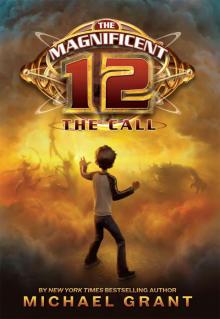 The Call
The Call Hero
Hero Soldier Girls in Action
Soldier Girls in Action Purple Hearts
Purple Hearts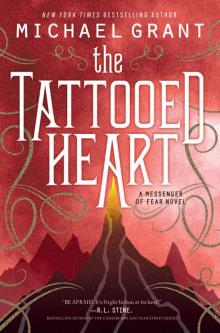 The Tattooed Heart
The Tattooed Heart The Fall of the Roman Empire
The Fall of the Roman Empire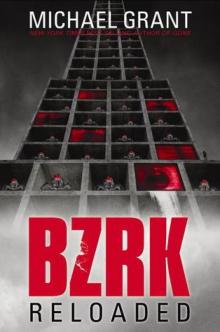 BZRK Reloaded
BZRK Reloaded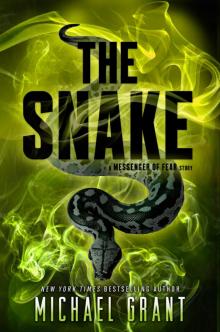 Messenger of Fear Novella #1
Messenger of Fear Novella #1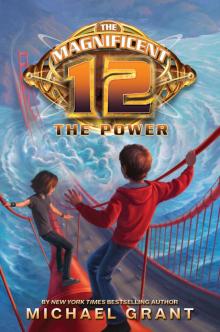 The Magnificent 12
The Magnificent 12 Fear: A Gone Novel
Fear: A Gone Novel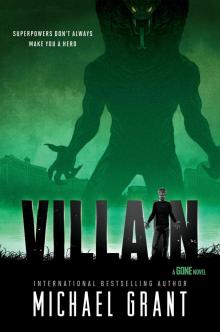 Villain
Villain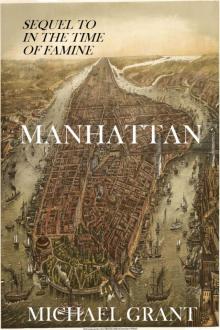 Manhattan
Manhattan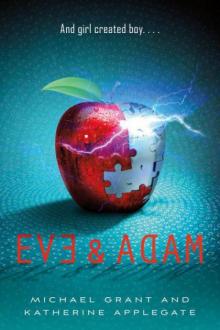 Eve and Adam
Eve and Adam Plague: A Gone Novel
Plague: A Gone Novel Fergie Rises
Fergie Rises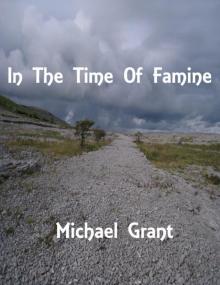 In the Time of Famine
In the Time of Famine Hunger_A Gone Novel
Hunger_A Gone Novel Lies g-3
Lies g-3